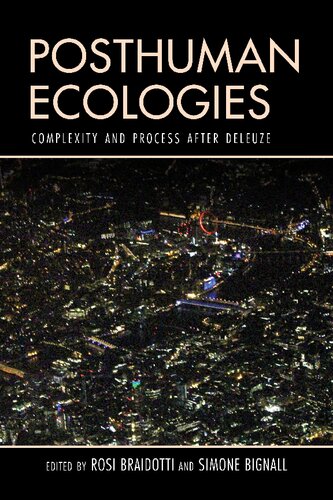Product desciption
Posthuman Ecologies Complexity And Process After Deleuze Rosi Braidotti by Rosi Braidotti, Simone Bignall 9781786608222, 9781786608239, 9781786608246, 1786608227, 1786608235, 1786608243 instant download after payment.
The devolved and dispersed character of human agency and moral responsibility in the contemporary condition appears linked with the deepening global trauma of ‘inhumanism’ as a paradox of the Anthropocene. Reclaiming human agency and accountability appears crucial for collective resistance to the unprecedented state of environmental and social collapse resulting from the inhumanity of contemporary capitalist geopolitics and biotechnologies of control. Understanding the potential for such resistance in the posthuman condition requires urgent new thinking about the nature of human influence in complex interactional systems, and about the nature of such systems when conceived in non-anthropocentric way. Through specific readings and uses of Deleuze’s conceptual apparatus, this volume examines the operation of human-actioned systems as complex and heterogeneous arenas of affection and accountability. This exciting collection extends non-humanist concepts for understanding reality, agency and interaction in dynamic ecologies of reciprocal determination and influence. The outcome is a vital new theorisation of human scope, responsibility and potential in the posthuman condition.
Review
This volume offers an alternative take on critiques of both humanism as inhuman and the posthuman. It presents a differential, diffractive selection of calls to creating new territories and networks at local, global and transversal levels, always attentive to the extensive and increasingly ambiguous emergences of what we currently consider ‘life’. (Patricia MacCormack, Professor of Continental Philosophy at Anglia Ruskin University)
This is an astoundingly rich collection of essays, edited and collected by one of the major forces in posthumanist thought, and one of postcolonial theory’s rising stars. Braidotti and Bignall have collected major figures in philosophy, geography, feminist theory and critical theory, and focused on the twenty-first century’s major challenges. How do we think about the future, given the present’s range of potentials for systemic collapse? These essays embrace complexity with a stunning level of lucidity and originality. (Claire Colebrook, Edwin Erle Sparkes Professor of English, Penn State University)
Simone Bignall and Rosi Braidotti’s Posthuman Ecologies stages a cutting-edge deployment of Deleuze’s work in relation to complex and heterogenous systems. Politically astute in its commitment to material differences, this innovative collection foregrounds the counter-knowledges, interdisciplinarity and affirmative ethics that we so desperately need as we grapple with the posthuman condition. (Hannah Stark, Senior Lecturer in English, University of Tasmania)
This is a rich and provocative compendium of difficult questions, valuable speculations and thoughtful, pointed answers. The contributors cut through the entanglements in this vital discussion and seek to re-establish the conversation around post-/in-/transhumanism(s) on a more fruitful ground. (Paul Gilroy, Professor of American and English Literature, King’s College London)
In this volume, concepts in need of revision – action, environment, change, response – are elegantly placed in conversation with one another. A timely contribution to the effort of becoming-human. (Zornitsa Dimitrova, PhD Graduate, University of Münster)
About the Author
Rosi Braidotti is Distinguished University Professor and founding Director of the Centre for the Humanities at Utrecht University. Her most recent books are The Posthuman (Polity, 2013), Nomadic Subjects (Columbia University Press, 2011) and Nomadic Theory (Columbia University Press, 2011) www.rosibraidotti.com
Simone Bignall is Senior Researcher in politics, based in the Office of Indigenous Strategy and Engagement at Flinders University in Australia. Her book publications include PostcolonialAgency: Critique and Constructivism (Edinburgh 2010); Deleuze and the Postcolonial (with Paul Patton); Agamben and Colonialism (with Marcelo Svirsky); and Deleuze and Pragmatism (with Sean Bowden and Paul Patton). She is currently completing a book on Posthuman Desire and a project titled Excolonialism: Ethics after Enjoyment.


